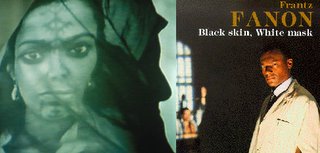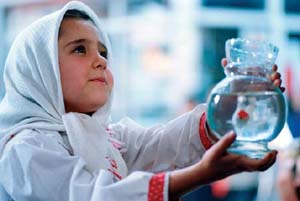Films Frantz Fanon: Black Skin, White Mask (Isaac Julien, 1996) and The White Balloon (Badkonake sefid; Jafar Panahi, 1995)

As part of the Duke University Screen Society Isaac Julien retrospective, on Monday night I saw the 1991 documentary film Frantz Fanon: Black Skin, White Mask. I didn't know about Frantz Fanon (1925–1961) was, but I learned that he is considered one of the key figures in analyzing the psychology of colonialism and the fight to achieve freedom from imperialism. The film, especially the first half, discusses from a largely academic perspective the notions of racism and post-colonialism, especially as applied to France. The second half describes how this Carribean-born French psychiatrist moves to Algeria to practice and then to inspire the freedom movement, embracing violence as an acceptable means.
From the Screen Society website: "Interviews, reconstructions and archive footage tell the story of the life and work of the highly influential anti-colonialist writer Franz Fanon, author of Black Skin, White Mask and The Wretched of the Earth, and his professional life as a psychiatric doctor in Algeria during its war of independence with France. Introduced by Profs. Ranjana Khanna (Depts. of English, Literature, and Women's Studies) and Maurice Wallace (Depts. of English and African & African American Studies)"

I also finished watching on videotape the Iranian film, The White Balloon. Written by perhaps the best known Iranian filmmaker, producer, and writer, Abbas Kiarostami, and directed by his student Jafar Panahi, this was a sweet film taking place on New Year's Eve in Tehran. Seven-year-old Razieh (Aida Mohammadkhani) has her heart set on purchasing a goldfish. After much nagging, her mother reluctantly gives her money. Razieh ends up with adventures with Sufi snakecharmers, a clothes merchant, a soldier, and an Afghan boy selling balloons, unfortunately losing her money down a grating along the way. The film gives a fun, unhurried, dose of local color in an endearing, realistic story.
There was a conflict for another film sounding well-worth seeing, coincident at Duke tonight, I Fight with my Camera. Civil rights photographer Charles Moore was to have appeared at the screening of the 27-minute film about his photography for Life Magazine, and was to have taken part in a panel discussion, along with filmmaker Dan Love.
Links of interest:
- Frantz Fanon: Black Skin, White Mask imdb (Internet Movie Database) film entry
- Wikipedia entry for Frantz Fanon
- The White Balloon imdb film entry


0 Comments:
Post a Comment
<< Home